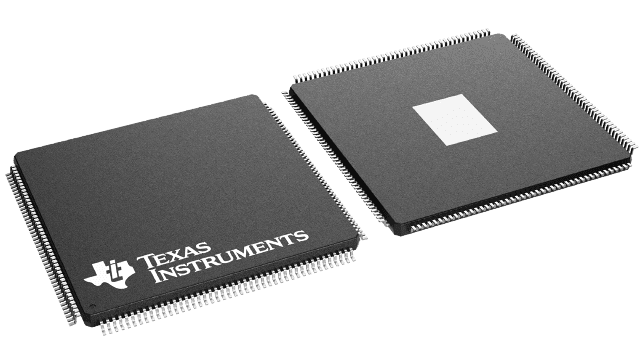封裝資訊
| 封裝 | 針腳 HLQFP (PTP) | 176 |
| 操作溫度範圍 (°C) 0 to 90 |
| 包裝數量 | 運送業者 40 | JEDEC TRAY (5+1) |
AM1705 的特色
- 375- and 456-MHz ARM926EJ-S™ RISC Core
- 32-Bit and 16-Bit (Thumb®) Instructions
- Single-Cycle MAC
- ARM Jazelle® Technology
- Embedded ICE-RT™ for Real-Time Debug
- ARM9 Memory Architecture
- 16KB of Instruction Cache
- 16KB of Data Cache
- 8KB of RAM (Vector Table)
- 64KB of ROM
- Enhanced Direct Memory Access Controller 3 (EDMA3):
- 2 Transfer Controllers
- 32 Independent DMA Channels
- 8 Quick DMA Channels
- Programmable Transfer Burst Size
- 128KB of RAM Memory
- 3.3-V LVCMOS I/Os (Except for USB Interface)
- Two External Memory Interfaces:
- EMIFA
- NOR (8-Bit-Wide Data)
- NAND (8-Bit-Wide Data)
- EMIFB
- 16-Bit SDRAM With 128-MB Address Space
- EMIFA
- Three Configurable 16550-Type UART Modules:
- UART0 With Modem Control Signals
- 16-Byte FIFO
- 16x or 13x Oversampling Option
- Autoflow Control Signals (CTS, RTS) on UART0 Only
- Two Serial Peripheral Interfaces (SPIs) Each With One Chip Select
- Programmable Real-Time Unit Subsystem (PRUSS)
- Two Independent Programmable Real-Time Unit (PRU) Cores
- 32-Bit Load-Store RISC Architecture
- 4KB of Instruction RAM per Core
- 512 Bytes of Data RAM per Core
- PRUSS can be Disabled Through Software to Save Power
- Standard Power-Management Mechanism
- Clock Gating
- Entire Subsystem Under a Single PSC Clock Gating Domain
- Dedicated Interrupt Controller
- Dedicated Switched Central Resource
- Two Independent Programmable Real-Time Unit (PRU) Cores
- Multimedia Card (MMC)/Secure Digital (SD) Card Interface With Secure Data I/O (SDIO)
- Two Master and Slave Inter-Integrated Circuit (I2C Bus™)
- USB 2.0 OTG Port With Integrated PHY (USB0)
- USB 2.0 Full-Speed Client
- USB 2.0 Full- and Low-Speed Host
- End Point 0 (Control)
- End Points 1, 2, 3, and 4 (Control, Bulk, Interrupt, or ISOC) RX and TX
- Two
Multichannel Audio Serial Ports (McASPs):
- Six Clock Zones and 28 Serial Data Pins
- Supports TDM, I2S, and Similar Formats
- FIFO Buffers for Transmit and Receive
- 10/100 Mbps Ethernet MAC (EMAC):
- IEEE 802.3 Compliant (3.3-V I/O Only)
- RMII Media-Independent Interface
- Management Data I/O (MDIO) Module
- One 64-Bit General-Purpose Timer (Configurable as Two 32-Bit Timers)
- One 64-Bit General-Purpose Watchdog Timer (Configurable as Two 32-Bit General-Purpose Timers)
- Three Enhanced Pulse Width Modulators (eHRPWMs):
- Dedicated 16-Bit Time-Base Counter With Period and Frequency Control
- 6 Single-Edge, 6 Dual-Edge Symmetric, or 3 Dual-Edge Asymmetric Outputs
- Dead-Band Generation
- PWM Chopping by High-Frequency Carrier
- Trip Zone Input
- Three 32-Bit Enhanced Capture (eCAP) Modules:
- Configurable as 3 Capture Inputs or 3 Auxiliary Pulse Width Modulator (APWM) Outputs
- Single-Shot Capture of up to Four Event Timestamps
- Two 32-Bit Enhanced Quadrature Encoder Pulse (eQEP) Modules
- 176-Pin PowerPAD™ Plastic Quad Flat Pack [PTP suffix], 0.5-mm Pin Pitch
- Commercial, Industrial, or Extended Temperature
All trademarks are the property of their respective owners.
AM1705 的說明
The AM1705 is a low-power ARM microprocessor based on an ARM926EJ-S.
The device enables original-equipment manufacturers (OEMs) and original-design manufacturers (ODMs) to quickly bring to market devices with robust operating systems, rich user interfaces, and high processor performance through the maximum flexibility of a fully integrated, mixed processor solution.
The ARM926EJ-S is a 32-bit RISC processor core that performs 32-bit or 16-bit instructions and processes 32-, 16-, or 8-bit data. The core uses pipelining so that all parts of the processor and memory system can operate continuously.
The ARM core has a coprocessor 15 (CP15), protection module, and data and program memory management units (MMUs) with table look-aside buffers. The ARM core has separate 16KB of instruction and 16-KB data caches. Both memory blocks are 4-way associative with virtual index virtual tag (VIVT). The ARM core also has 8KB of RAM (Vector Table) and 64KB of ROM.
The peripheral set includes: a 10/100 Mbps Ethernet MAC (EMAC) with a management data input/output (MDIO) module; two I2C Bus interfaces; three multichannel audio serial ports (McASPs) with serializers and FIFO buffers; two 64-bit general-purpose timers each configurable (one configurable as watchdog); up to 8 banks of 16 pins of general-purpose input/output (GPIO) with programmable interrupt/event generation modes, multiplexed with other peripherals; three UART interfaces (one with both RTS and CTS); three enhanced high-resolution pulse width modulator (eHRPWM) peripherals; three 32-bit enhanced capture (eCAP) module peripherals which can be configured as 3 capture inputs or 3 auxiliary pulse width modulator (APWM) outputs; two 32-bit enhanced quadrature encoded pulse (eQEP) peripherals; and 2 external memory interfaces: an asynchronous and SDRAM external memory interface (EMIFA) for slower memories or peripherals, and a higher speed memory interface (EMIFB) for SDRAM.
The Ethernet Media Access Controller (EMAC) provides an efficient interface between the device and the network. The EMAC supports both 10Base-T and 100Base-TX, or 10 Mbps and 100 Mbps in either half- or full-duplex mode. Additionally, an MDIO interface is available for PHY configuration.
The I2C, SPI, and USB2.0 ports allow the device to easily control peripheral devices and/or communicate with host processors.
The rich peripheral set provides the ability to control external peripheral devices and communicate with external processors. For details on each peripheral, see the related sections later in this document and the associated peripheral reference guides.
The device has a complete set of development tools for the ARM processor. These tools include C compilers and a Windows® debugger interface for visibility into source code execution.
